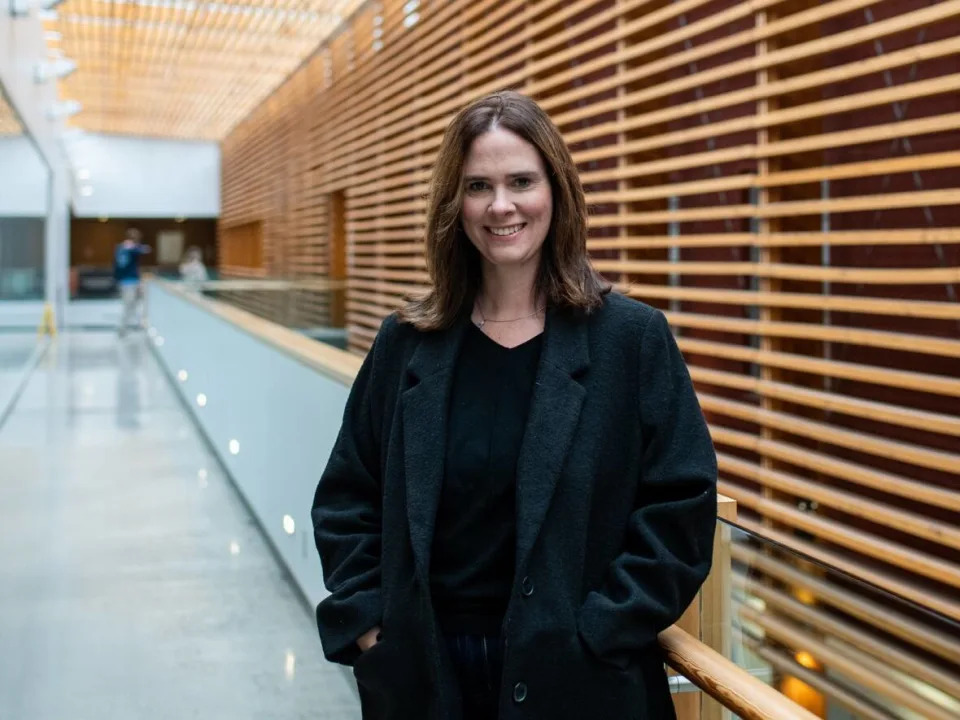One B.C. professor is on a quest to understand women's love affair with true crime podcasts
Mon, December 26, 2022

Kathleen Rodgers is a sociology professor at the University of the Fraser Valley. (Mitch Huttema/University of the Fraser Valley Communications - image credit)
For Kathleen Rodgers, and like for so many women, listening to true crime podcasts started off as an escape from everyday life.
But Rodgers is a sociologist, so as she followed the exploding popularity of the genre, she couldn't help but notice the growing communities of fans online, and how they were responding to the grisly murders they were hearing about.
"There's a basic human interest in stories, and true crime stories are the best stories. They have mystery and crime and villains and justice," Rodgers told CBC.
"I also came to realize that I was interested in it for the same reason that a lot of other women were interested in it, which was that the fear of violence is something that a lot of women have on a daily basis."
That curiosity has become an academic fixation. Rodgers, an associate professor at the University of the Fraser Valley in Abbotsford, B.C., has now focused her research on women-centred true crime podcast fandoms and how they've become centres of debate and activism.
This summer, she published her first paper on the topic, titled "'F*cking Politeness' and 'Staying Sexy' While Doing It: Intimacy, Interactivity and the Feminist Politics of True Crime Podcasts."
It focuses on Facebook groups, Twitter accounts and Reddit communities connected to the popular podcast My Favorite Murder, and how fans use memes, jokes and personal stories to process what they're hearing, push back on victim-blaming narratives and find comfort in shared experiences.
She saw women stressing the importance of personal safety over the "politeness" referenced in the title of her paper, and even providing hyper-local tips about things like specific bus stops to avoid and suspicious strangers to watch out for.
'Catharsis' when justice is done
Rodgers was also able to speak to fellow true crime fans about why they're so attracted to stories about violence. As she had suspected, many women said they felt reassured to learn they weren't alone in their fears about strangers, dark alleys, domestic violence and sexual assault.
"There is also some catharsis to hearing about the fact that the kind of person that you fear, that was responsible for the kind of crime that you're afraid of, has been brought to justice," she said.
At the same time, Rodgers explored how online communities address some common criticisms of the true crime genre, including the "trauma porn" label.
For families of victims, it can be disturbing to hear strangers treating a loved one's death as entertainment. There are also criticisms of what sometimes feels like a celebration of serial killers, dehumanization of victims and the focus on victims who are young, white and pretty.

Kaspars Grinvalds/Shutterstock
Rodgers found that fan communities are pushing back on these tropes and demanding a more thoughtful approach.
"For instance, a lot of hosts of traditional true crime might have used language like 'prostitutes,' and the community of listeners said, hey, that's not a helpful way of talking about women who are victims of crime," she said.
In response, she said she's seen a recent shift away from that language.
Rodger's research on My Favorite Murder goes on to describe a "series of explosive Facebook controversies" over the show's focus on white middle class victims.
"The podcast communities really broke this down and said, hey, yep, those are tragic stories. But what about the stories of the marginalized, racialized women who are much more likely to experience violence in the first place?" she said.
Since then, Rodgers writes that she has seen the podcast's hosts pay more attention to the risks faced by women of colour.
Her next research paper is tentatively titled "Are True Crime Podcasts Feminist?"
Right now, she's trying to quantify some of the trends she's observed, to see how the feedback and criticism directed at true crime podcasts is actually changing the way these stories are presented.
At the moment, Rodgers says she's between podcasts, but some of her all-time favourites include The Teacher's Pet, an Australian production that led to a conviction in a cold case murder, the Canadian podcasts Dark Poutine and Canadian True Crime, CBC's Uncover, and the podcast that kicked off the true crime craze, Serial.
No comments:
Post a Comment